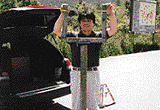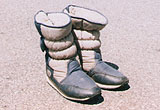 Tsuruhiko Kiuchi
Tsuruhiko Kiuchi
 Tsuruhiko Kiuchi is a comet-researcher from Usuda-machi, Minamisaku-gun, Nagano Prefecture.
Tsuruhiko Kiuchi is a comet-researcher from Usuda-machi, Minamisaku-gun, Nagano Prefecture.
He fell in love with the stars and the mysteries of the universe as a child, when he built his own telescope for star-gazing. At the time, he was excited by the sight of the Ikeya-Seki comet.
Kiuchi's passion for space grew, and he spent his high school years mainly in activities with the Astronomy Club. His love of the skies led him to enter Japan's Air Self Defense Forces, but a close call with death just before his 23rd birthday convinced him that his true purpose in life was to search for comets. Seeking his adventure among the stars, he returned to his hometown, where he has been observing the heavens ever since. In a few years, he has discovered several comets. In particular, his September 27, 1992, discovery of the Swift-Tuttle comet had a major impact on his life. In addition to comet-watching, Kiuchi is principle of the Columbus College.
Nature School in Usuda-machi and an instructor/observer of the Usuda-machi Star Club. His written works include Memory of the Skies published by Ryuoh Shobo.
Why did we interview Kiuchi to "sense" Japan?

"Look more closely from farther away. That is my way of thinking."
Kiuchi's daily regimen starts at 7 a.m. He has to be in his office at 7:30. He departs for his
workshop between 5:30 and 6:30 p.m. This workshop is like a child's secret club house, a
sanctuary in which he can relax and enjoy the moment. Upon returning home, he bathes, finishes
his evening meal, and then goes out to star-gaze. The normal routine for his observation runs
from an hour and a half after sunset until an hour and a half before sunrise. He only takes breaks
or is unable to make his observations during inclement weather, on days when he has to give
lectures, and during the five-day cycle of the full moon. Aside from these restrictions, he
performs his observations every day.
|
|
"Humans and the universe are fragmented. Nature coexists in a proper order. Sometime there
are those who say it is not good for we humans to extend our hands in behalf of ourselves, but I
don't think this way. We received the gift of intelligence. Shouldn't we therefore make the most
of it and the role we play in our existence with nature? For example: a forest left untouched
would become damaged and laid waste. The people of ancient times felt it was part of their role
to thin the forests by taking what was necessary to meet their needs. This is more in keeping
with the concepts of the natural order."
|

>>Approaching...<< |
The Hale-Bopp comet that Kiuchi photographed on July 23, 1996.
The Hale-Bopp comet was discovered in July of last year.This comet is a mammoth compared to most.Most comets have a diameter ranging from several to 10 kilometers. However, Hale-Bopp has a diameter of over 100 km. It is forecast to grow to brightness level 2 in April of next year.
Astronomy fans looking forward to that coming day.
|

>>Getting closer...<< |
The Hale-Bopp comet that Kiuchi photographed on November 16, 1996.
|

>>perseid<< |
Perseid Meteo Shower that Kiuchi photographed on August 12, 1996.
|

|
 Why We Interviewed Tsuruhiko Kiuchi to Join Us Why We Interviewed Tsuruhiko Kiuchi to Join Us
On September 27, 1992, Tsuruhiko Kiuchi rediscovered the Swift-Tuttle comet, for which astronomers the world over had been searching. Swift-Tuttle was the fourth comet discovered by Kiuchi, who had every reason to be excited.
However, calculating the orbit of Swift-Tuttle, Kiuchi was in for a surprise. It appeared that, on its return in 2126, the comet might have a near miss with the earth!
Kiuchi says that the comets he discovers are "like my children." Faced with the possibility that one of his children might collide with the earth, Kiuchi's shock was considerable.
On the other hand, it was just like Kiuchi to try to view things optimistically. He though that, "If there is a danger of this comet hitting the earth, the advent of the collision might bring the world's people together." Convinced that "this is the job of the comet's discoverer," Kiuchi has promoted a number of activities in preparation of 2126. (Recently, new calculations of the Swift-Tuttle comet's orbit have eliminated the possibility of a near miss. But, this is space we are discussing. The possibility always exists of a miscalculation surpassing human knowledge.)
Inside of Kiuchi, who remains aware of his place in the universe while looking at the stars, is the knowledge that "nature, humanity and the universe" are one. We who easily forget this fact have much to learn from Kiuchi's philosophy. (See individual contents for details.)
Every night, Kiuchi observes the night sky through a large pair of binoculars. Casting light on his relationship with the Swift-Tuttle comet, we hope to remind people of the dynamism of their own relationship with the universe. (sensorium staff, Ueda) |
|
 |

Enter your opinions, comments and questions in the comments page.
To register to receive updated information about sensorium, please go to the Frequently Asked Questions (FAQs) page.
[Kiuchi Living with Comets]
[map page of sensing Japan]
 Tsuruhiko Kiuchi is a comet-researcher from Usuda-machi, Minamisaku-gun, Nagano Prefecture.
Tsuruhiko Kiuchi is a comet-researcher from Usuda-machi, Minamisaku-gun, Nagano Prefecture. Tsuruhiko Kiuchi
Tsuruhiko Kiuchi










 Why We Interviewed Tsuruhiko Kiuchi to Join Us
Why We Interviewed Tsuruhiko Kiuchi to Join Us
